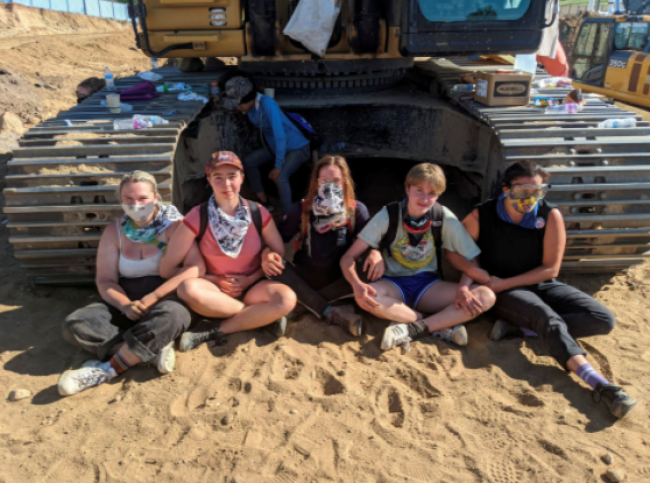Articles Menu

June 11, 2021
Nearly 250 people were arrested in Minnesota on Monday June 7 protesting against a Canadian-owned tar sands pipeline being built on Indigenous lands.
The Associated Press reports: “Hubbard County Sheriff Cory Aukes said 179 people were arrested and charged with gross misdemeanor trespassing. An additional 68 people were cited for public nuisance and unlawful assembly. It was the largest show of resistance since protesters set their sights on the project.”
The Park Rapids Enterprise also reported: “Over 500 Indigenous people and allies shut down an active Line 3 pump station. Protesters linked arms and created blockades of debris at the site, including parking a boat across the roadway.”
That article adds: “According to Minnesota Public Radio, at one point, a U.S. Border Patrol helicopter flew in very low to try to flush out demonstrators from the site. It hovered about 20 feet off the ground, blowing up sand and dirt aggressively. A loudspeaker broadcast warned people they would be arrested if they didn’t leave the area.”
Canadian company pays for the police
This past March, Emily Atkin reported in Heated: “Enbridge established a financial relationship with Minnesota law enforcement in May 2020, when the state Public Utilities Commission approved Line 3’s route permit. That permit required the oil giant to set up a special fund that would reimburse police responding to anything pipeline-related.”
Atkin adds: “The permit said law enforcement could get reimbursed by Enbridge for any activity related to public safety and the pipeline.”
Notably, Atkin cites an article in The Intercept that reports a Minnesota Sheriff’s Office has requested Enbridge reimburse them for nearly $72,000 worth of riot gear and more than $10,000 in other costs including tear gas, pepper spray and batons.
The Line 3 pipeline financed by Canadian banks
The Calgary-based Enbridge Inc. 760,000 barrel per day Line 3 tar sands pipeline would run from Hardisty, Alberta to Superior, Wisconsin. It would be 1,659 kilometres in length, of which about 585 kilometres would be in the United States.
Prime Minister Justin Trudeau approved the construction of the Line 3 pipeline in Canada in November 2016. Enbridge has reported that the Canadian portion of the pipeline is complete and began commercial service in December 2019.
The Rainforest Action Network (RAN) has documented that the top five financiers of Enbridge are Canadian banks: TD Bank, Bank of Montreal, Scotiabank, RBC and CIBC. Collectively they have provided billions of dollars in financing to Enbridge.
Current status of pipeline
RAN has noted: “The [542 kilometre] Minnesota stretch of the pipeline is all that remains to be built. In November 2020, the Minnesota Pollution Control Agency approved the final permits for the pipeline.”
Work on the pipeline began in Minnesota on December 1, 2020 and was expected to take 6 to 9 months to complete.
Earlier this week, Winona LaDuke of Honor the Earth stated that the pipeline is “far from done” at this point with “35 or 40 percent” completed and that Enbridge still has many rivers to cross that they can’t begin to do until July.
Reuters has also noted: “Enbridge and opponents are waiting for a ruling from the Minnesota Court of Appeals, due by June 21, on whether there is sufficient evidence of crude oil demand to justify replacing Line 3.”
[Top Photo by Nicholas Pfosi/Reuters.]